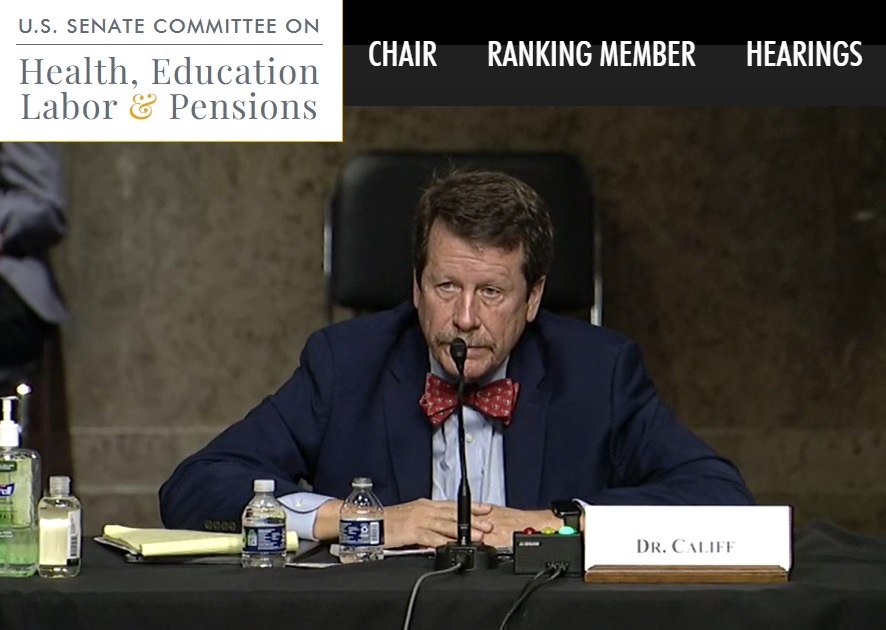On Tuesday, the U.S. Senate Committee on Health, Education, Labor and Pensions held hearings on whether to approve Robert Califf, President Joe Biden’s nominee to head the Food and Drug Administration (FDA). Califf previously headed the agency in 2016, when the agency extended the use of the deadly abortion pill regimen to preborn babies from seven weeks up to 10 weeks.
If approved, Califf would replace acting FDA Commissioner Janet Woodcock, who previously served as Director of the FDA’s Center for Drug Evaluation and Research in the years when the agency first approved the abortion pill in the U.S.
“My priorities, if confirmed, would be: emergency preparedness and response; consumer and patient protection; and modernization and innovation,” Califf wrote in his prepared statement, where he dodged the issue of abortion.

Robert Califf Dec 14, 2021 Senate hearing for FDA Commissioner asked about the abortion pill
Califf’s history with FDA
Robert Califf served as the Obama Administration’s FDA Commissioner from 2016-2017 following his 2015 nomination. Under Califf’s leadership, in 2016, the FDA enabled several modifications to a safety requirement for the abortion pill (Mifeprex) known as the Risk Evaluation and Mitigation System (REMS), which the FDA requires “for certain medications with serious safety concerns.” Only a few medications require REMS.
Califf was asked about his position on the REMS, drastically loosened by the Biden Administration’s FDA during the COVID-19 pandemic. Currently, the abortion pill mifepristone (Mifeprex) and a second drug, misoprostol (Cytotec and others) used in the FDA approved regimen may be ordered online and shipped to customers by mail.
For safety reasons, REMS prohibits the pill from being ordered online or in a pharmacy and limits distribution to approved facilities or hospitals which are required to properly date a woman’s pregnancy, rule out the possibility of a dangerous ectopic pregnancy, and can respond to emergencies or refer to a facility that can.
Califf questioned by Senator Richard Burr
During the hearing, North Carolina Senator Richard Burr raised the issue of Califf’s history with the FDA REMS on the abortion pill. “You’ve had a history with the the Risk Evaluation and Mitigation System or REMS for the drug mifepristone,” Senator Burr stated. “Many around the country have asked that you address this issue.”
Thank you @SenatorBurr for raising with FDA Commissioner nominee Robert Califf Americans' concerns over weakening safety requirements on dangerous chemical abortion drugs pic.twitter.com/lr5yp94VBW
— Susan B. Anthony List #ModernizeOurLaw (@SBAList) December 14, 2021
In 2016, Califf’s FDA modified the REMS safety protocols to allow the deadly drug to be used on babies at 10 weeks (70 days), three weeks past the 49 days (7 weeks) for which the drug was approved in 2000. These changes prompted several lawmakers to express deep “disappointment” in a letter to Commissioner Califf, calling the drug’s approval process “extremely controversial.”
“Do you believe that the FDA needs to take any action to further weaken the REMS for this or similar drugs — or can you reassure us that no changes are needed at this time?” Senator Burr also asked.
Califf responded, “I’m aware… that FDA has filed a court document indicating that its review of the REMS… on mifepristone is soon going to be available. As you know… I’m not involved in those discussions, and I can’t predict the outcome.”
He then expressed “great confidence” in the “FDA staff” to use the “latest available evidence and core scientific principles” to make the “best possible” decision.
Senator Burr finished his questions by submitting the testimony of a woman who experienced complications from the abortion drug to the committee.
The “court document” (Chelius v. Becerra) to which Califf is referring was filed in 2017 by the American Civil Liberties Union (ACLU) to challenge the REMS on behalf of Hawaiian doctor Graham T. Chelius.
In April of 2021, the Biden Administration’s FDA enabled temporary abortion pill distribution by mail during the COVID-19 pandemic. And on November 3, 2021, a status update was filed in the Chelius case, which indicated that the “FDA… anticipates completing its review by December 16, 2021” and the stay on the lawsuit was extended until January 14, 2022 to “give the Parties time to determine appropriate next steps in this litigation.”
Califf questioned by Senator Mike Braun
Indiana Senator Mike Braun also asked Califf about the REMS on the abortion pill, noting how under Califf’s “leadership in 2016” the FDA had “weakened” the safety regulations regarding the abortion pill.
Senator Braun mentioned a recent study which analyzed Medicaid data within the 17 states that allow taxpayer funded abortions, which found that the rate of abortion-related ER visits for chemical abortions increased 507% from 2002-2015.
“Do you think we need to be in that relaxed kind of interpretation of that particular approach or is this something you’re going to listen to current information… so that you give… a full kind of consideration of that particular methodology of abortions?” Senator Braun asked.
Thank you @SenatorBraun for asking FDA Commissioner nominee Robert Califf if he will follow the latest data and science to protect women and girls from the risks of dangerous chemical abortion drugs pic.twitter.com/iVwJrg2JFf
— Susan B. Anthony List #ModernizeOurLaw (@SBAList) December 14, 2021
Again, Califf dodged, claiming, “I’m not involved in that particular reevaluation” of the REMS. “But I can assure you that the staff will be looking at the latest data and applying the best science and make the best possible decision,” Califf stated. “I’ve got confidence in that staff, and I know them well.”
FDA abortion pill process has been secretive
One wonders if the “staff” reviewing the REMS on the abortion pill will be made public, given how the FDA politicized the abortion pill’s approval process two decades ago by choosing not to publish the names of the “experts” who reviewed the drug.
The names of the FDA staff involved with approving the abortion pill have never been released.
In addition, with collusion from the FDA, the majority of Danco executives, investors, and locations have been kept secret. The only abortion pill investors made public were those already heavily investing in abortion — groups like the Buffett Foundation, billionaire George Soros’ Open Society Foundations, and the David and Lucile Packard Foundation, which granted Danco a $14 million loan in its beginnings.
Today, multiple spokespersons and study authors claiming that the abortion pill is “safe” have openly disclosed being on the payroll of Danco or its generic manufacturer GenBioPro, and there is no indication that the FDA will take this into consideration.
In addition, clinical trials and studies which proclaim the safety of the abortion pill as safe have been sponsored by organizations with ties to original abortion pill investors like the Packard and Buffett Foundations. These studies are often funded by known abortion pill investors and published in journals heavily tied to the abortion industry.

Tweet Sarah Karlin Smith on whether abortion pill will sabotage Robert Califf nomination to FDA (Image: Twitter)
Senator Roger Marshall
In the hearing, Kansas Senator Dr. Roger Marshall mentioned the complications faced by teens and women who use the abortion pill regimen.
“RU-486 is a drug I’ve never prescribed as an obstetrician/gynecologist, but unfortunately I’ve had to take care of patients with complications from it, typically in the emergency room,” the Senator stated. “These patients not only have physical complications, hemorrhaging and bleeding, but certain psychological challenges after they’ve had that abortion…”
During the hearing on the nomination of Dr. Robert Califf to serve as FDA commissioner, Sen @RogerMarshallMD shares how, as a pro-life obgyn, he has cared for women and girls in the emergency room who were suffering complications after taking dangerous chemical abortion drugs pic.twitter.com/R8R64jgo5i
— Susan B. Anthony List #ModernizeOurLaw (@SBAList) December 14, 2021
A recent analysis of adverse events reports (AERs) submitted to the FDA by Danco revealed that abortion pill clients experiencing a complication are more likely to receive care from an emergency room than the abortion facility where they obtained the pills.
Recent study results out of the U.S., which mirror data from the UK, have revealed that 6% of “known outcomes” from the abortion pill were severe enough to result in emergency room or urgent care visits. In the U.S., this could mean that potentially 20,380 women per year are seeking care at an ER or urgent care facility after taking the abortion pill.
“I’m very troubled by HHS’ casual attitude about prescribing RU486 [the abortion pill],” Senator Marshall added.
Califf is a ‘dangerous choice’
“Dr. Robert Califf is a dangerous choice to lead the federal Food and Drug Administration,” Noah Brandt, Live Action’s Director of Government Affairs, told Live Action News. “During his previous stint serving the FDA under the Obama administration, Dr. Califf did a big favor to the abortion industry by changing the reporting structure related to adverse effects from chemical abortion. The changes under his watch included only reporting deaths related to chemical abortion, and no longer reporting other adverse effects including traumatic and near-death complications. This calloused move made at the behest of the abortion industry has dealt a major blow to the already inadequate data surrounding chemical abortion in particular.”
Brandt noted that Califf “did nothing to allay concerns that his confirmation would prove catastrophic for mothers and families.” He anticipated that Califf’s nomination to lead the FDA “remains in harsh contention as even Democratic Senator Joe Manchin of West Virginia has made his opposition clear.”
A vote on Califf’s confirmation has not been scheduled, but is expected in 2022.
Editor’s Note: FDA has received reports of serious adverse events in women who took mifepristone. As of June 30, 2021, there were reports of 26 deaths of women associated with mifepristone since the product was approved in September 2000, including two cases of ectopic pregnancy (a pregnancy located outside the womb, such as in the fallopian tubes) resulting in death; and several cases of severe systemic infection (also called sepsis), including some that were fatal. The adverse events cannot with certainty be causally attributed to mifepristone because of concurrent use of other drugs, other medical or surgical treatments, co-existing medical conditions, and information gaps about patient health status and clinical management of the patient. A summary report of adverse events that reflects data through June 30, 2021 is here.
“Like” Live Action News on Facebook for more pro-life news and commentary!







